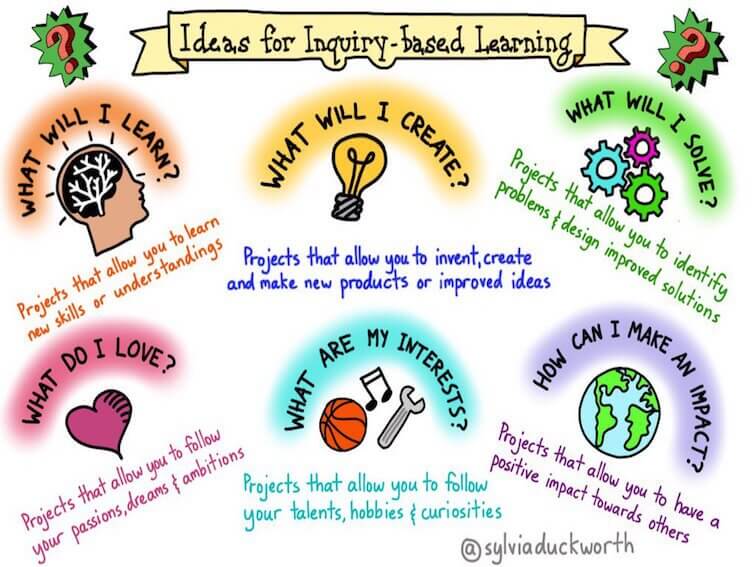Inquiry-based learning
Inquiry-based learning is a learning process that builds real-world connections through exploration and high-level questioning. It is a learning method that encourages students to engage in problem-solving and experiential learning. In addition to learning through play, mentorship, and self-directed learning, inquiry-based learning happens whether we plan for it or not. When anyone is curious or confused and then uses that curiosity or confusion to drive their own learning, they’re ‘doing’ inquiry-based learning. (TeachtoughtStaff, 2022)
Specific learning processes that people engage in during inquiry-based learning include:
- Create your problems
- Obtain supporting evidence to answer the question
- Explain the evidence gathered
- Relate explanations to knowledge gained from the investigation process
- Create arguments and reasons for the explanation
Add a personalization element when choosing an inquiry-based learning project, which includes the following questions:

The four stages of inquiry-based learning:
Interacting
Because the inquiry is open-ended and based on curiosity, traditional research methods may not be the most effective or exciting way to investigate. Students are encouraged to interact with unique materials and sources such as peers, experts, or formal and informal media in exciting and exploratory ways. Students should be involved in finding a research method that interests them and is available to them.
Clarifying
Clarification occurs as students delve into the material and gain a better understanding of their chosen topic, their thoughts on it, and what steps might be required to address the project. Students should be concerned with possibilities and the credibility of sources and be fully aware of relevant facts and opinions and their potential impact on their work.
Questioning
A more critical stage of inquiry-based learning is asking questions. As students begin to formulate questions to drive self-directed inquiry, any weaknesses in their thinking or understanding should become clear to help them realize the limits of the scope of their work or begin to understand what information is lacking and move forward to address any gaps in knowledge.
Designing
The final stage of the inquiry-based learning process focuses on designing or being able to create an informative and curiosity-driven product that creatively satisfies the initial inquiry. This result is the answer or solution and should demonstrate the process – although this is what the student will inevitably focus on, real learning comes along the way.
Six important aspects of inquiry-based learning:
- Students should be able to realize that science is more than memorizing and knowing facts.
- Students should be able to develop new knowledge that builds on their previous knowledge and scientific ideas.
- Students will develop new knowledge by reorganizing their previous understanding of scientific concepts and adding further information to their learning.
- Students’ social environment influences learning, and they have opportunities to learn from each other.
- Students will control their learning.
- The degree to which students can learn with deep comprehension will affect the transferability of their new knowledge in real life.
Learning focuses around a meaningful, ill-structured problem that demands consideration of diverse perspectives. (Terry 2022)One of the ultimate goals of education is to instill in students the ability to identify problems, brainstorm ideas, and implement solutions. Inquiry-based learning provides an opportunity to think about the world, our place, and how we can improve it while providing an essential framework for critical thinking and curiosity.
Comment:
Thank you for sorting out the Passive & Active Learning points! I also think group learning is a good choice for me to learn because it allows me to take responsibility. In addition, I don’t have to complete a task with a lot of work by myself, which reduces my pressure. In addition, traditional teaching through teacher teaching is passive learning, long hours of teaching often make me unable to concentrate, so I prefer active learning! Thanks for sharing!
Reference:
TeachThought Staff. (2022, January 21). Students Can Use These Questions To Guide Their Inquiry-Based Learning. TeachThought. Retrieved October 8, 2022, from https://www.teachthought.com/pedagogy/questions-students-can-use-guide-inquiry-based-learning/
Terry Heick. (2022, January 20). What Are The Phases Of Inquiry-Based Learning? A Guide For Teachers. TeachThought. Retrieved October 8, 2022, from https://www.teachthought.com/pedagogy/phases-inquiry-learning/
Thank you for sharing information about Inquiry-based learning! It looks like you found a number of helpful sources. However, the purpose of the blog was to explain the concept in your own words while mentioning the sources from where these ideas come, provide examples, and/or think about how you would use it in your learning resource. Direct copy-paste from the original source violates academic integrity.